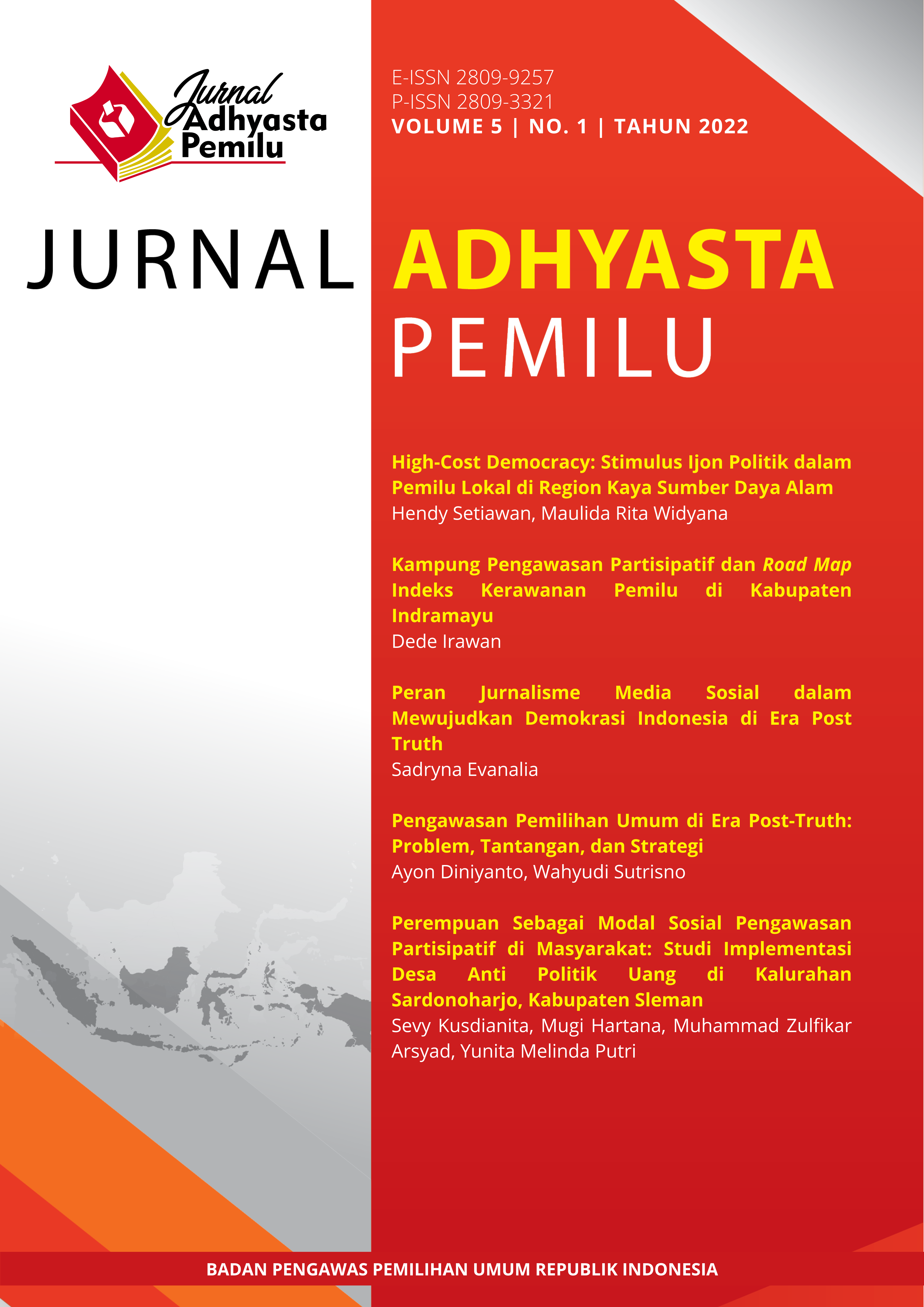Peran Jurnalisme Media Sosial dalam Mewujudkan Demokrasi Indonesia di Era Post Truth
DOI:
https://doi.org/10.55108/jap.v5i1.86Kata Kunci:
democration, hoax, social media, post-truth, social media journalism, normative media theoryAbstrak
Social Media is one of the public spaces for discussing and participating in politics to realize democracy. However, social media also has a weakness in disseminating hoaxes, misinformation, and exposing the Post Truth phenomenon that threatens the sustainability of democracy in Indonesia. The Normative Media Theory suggests that a media should (1) guarantee freedom of opinion, (2) convey information and know the truth, (3) be independent and reduce the interests of media owners, (4) have a variety of information available to the public, (5) reach out to the public. broadly various audiences, (6) supports a democratic political system, (7) and respects the privacy and human rights in general. This study investigates the role of KompasTV social media in realizing democracy in the post-truth era as a form of social media journalism. The research method used is descriptive qualitative with data collection in the form of observations and interviews. From the results of the research, it was found that KompasTV social media journalism upholds aspects of the Normative Media Theory perspective by prioritizing news value, verification, and fact-checking to ward off and avoid hoaxes, due to important and interesting things for the community. However, as a media that plays in the realm of social media, KompasTV in the pre-election period used SEO (Search Engine Optimization), Trending Topics, and viral issues in its journalistic production to increase views. Meanwhile, during the election period, KompasTV social media put forward the principle of balance.
Unduhan
Referensi
Ananda, P. (2020). Jumlah Berita Bohong di Pilkada 2020 Menurun. Retrieved March 3, 2022, from Media Indonesia website: https://mediaindonesia.com/politik-dan-hukum/367110/jumlah-berita-bohong-di-pilkada-2020-menurun
Creswell, J. W. (2009). Research Design: Qualitative, Quantitative, and Mixed Methods Approaches. California: SAGE Publications. Inc. Retrieved from http://www.drbrambedkarcollege.ac.in/sites/default/files/research-design-ceil.pdf
Febriansyah, F., & Muksin, N. N. (2020). Fenomena Media Sosial: Antara Hoaks, Destruksi Demokrasi, dan Ancaman Disintegrasi Bangsa. Sebatik, 24(2), 193–200. https://doi.org/10.46984/sebatik.v24i2.1091
Higgins, K. (2016). Post-Truth: A Guide for the Perplexed. Retrieved March 3, 2022, from Nature website: https://www.nature.com/articles/540009a
Kaid, L. L. (2004). Handbook of Political Communication Research. New Jersey: Lawrence Erlbaum Associates, Inc. https://doi.org/10.4324/9781410610584
Kemp, S. (2021). Digital in Indonesia. Retrieved March 3, 2022, from Global Digital Insights website: https://datareportal.com/reports/digital-2021-indonesia
Kholisoh, M., Nurkhaeni, T., Surya Ningrum, P., & Fitriani, I. (2019). Peran Media Sosial Dalam Demokrasi Masa Kini. Retrieved from https://osf.io/f7ckp/
Lestari, R. D. (2020). Jurnalisme Digital dan Etika Jurnalisme Media Sosial: Studi pada Akun Instagram @tempodotco dan @tribunjogja. Jurnal Ilmu Pengetahuan Dan Teknologi Komunikasi, 22(2), 159–174. https://doi.org/10.33164/iptekkom.22.2.2020.159-174
Lindgren, S. (2014). Digital Media and Society. In Digital Media and Society: Transforming Economics, Politics and Social Practices. Los Angeles: SAGE Publications Inc. https://doi.org/10.1057/9781137393630
Mahpudin, M. (2019). Pemanfaatan Teknologi Pemilu di Tengah Era Post Truth: Antara Efisiensi dan Kepercayaan. Jurnal PolGov, 1(2), 157. https://doi.org/10.22146/polgov.v1i2.55886
Miles, M. B., Huberman, A. M., & Saldaña, J. (2014). Qualitative Data Analysis (Edition 3). Los Angles: Arizona State University.
Muqsith, M. A., & Muzykant, V. L. (2019). Effect Fake News for Democracy. Jurnal Cita Hukum, 7(3). https://doi.org/10.15408/jch.v7i3.12956
Nasrullah, R. (2017). Media Sosial: Perspektif Komunikasi, Budaya dan Sosioteknologi. Bandung: Simbiosa Rekatama Media.
Perloff, R. M. (2021). The Dynamics of Political Communication: Media and Politics in a Digital Age. In The Dynamics of Political Communication: Media and Politics in a Digital Age. New York: Routledge. https://doi.org/10.4324/9780429298851
Pusparisa, Y. (2020). Puncak Penyebaran Hoaks Terjadi Menjelang Pilpres 2019. Retrieved March 3, 2022, from Kata Data website: https://databoks.katadata.co.id/datapublish/2020/01/07/jelang-pemilu-hoaks-makin-berseliweran
Ratmono, B. M., & Gunawan, B. (2021). Demokrasi di Era Post Truth. Jakarta: Gramedia Pustaka Utama.
Reitz, A. (2012). Social Media’s Function in Organizations: A Functional Analysis Approach. Global Media Journal, 5(2), 41–56. Retrieved from http://search.proquest.com/docview/1266767588?accountid=17214
Shaw, D. L., & McCombs, M. E. (1977). The Emergence of American Political Issues : the Agenda-Setting Function of the Press. St. Paul: West Publishing Company.
Siregar, A. E., Rahayu, Rianto, P., & Adiputra, W. M. (2014). Menakar Independensi dan Netralitas Jurnalisme Media di Indonesia. Dinamika Pers Dan Pemilu, 9(1), 3–39.
Socialblade. (2022). Top 100 YouTubers Channels in Indonesia. Retrieved March 3, 2022, from Socialblade website: https://socialblade.com/youtube/top/country/id/mostsubscribed
Solihat, M. (2015). Diversifikasi Media Massa dan Demokrasi di Indonesia. Jurnal Ilmu Politik Dan Komunikasi, 5(2), 95–102. https://doi.org/10.34010/jipsi.v5i2.230
Sugiyono. (2004). Statistika untuk Penelitian (Cetakan Ke). Bandung: Penerbit Alfabeta.
Susanto, R. D., & Irwansyah. (2021). Media Sosial, Demokrasi, dan Penyampaian Pendapat Politik Milenial Di Era Pasca-Reformasi. LONTAR: Jurnal Ilmu Komunikasi, 9(1), 65–77. https://doi.org/10.30656/lontar.v9i1.3249
Syam, N. K. (2006). Sistem Media Massa Indonesia di Era Reformasi: Perspektif Teori Normatif Media Massa. Mediator: Jurnal Komunikasi, 7(1), 71–76. https://doi.org/10.29313/mediator.v7i1.1224
Utami, P. (2019). Hoax in Modern Politics. Jurnal Ilmu Sosial Dan Ilmu Politik, 22(2). https://doi.org/10.22146/jsp.34614
Unduhan
Diterbitkan
Cara Mengutip
Terbitan
Bagian
Lisensi
Hak Cipta (c) 2022 Sadryna Evanalia

Artikel ini berlisensi Creative Commons Attribution 4.0 International License.



